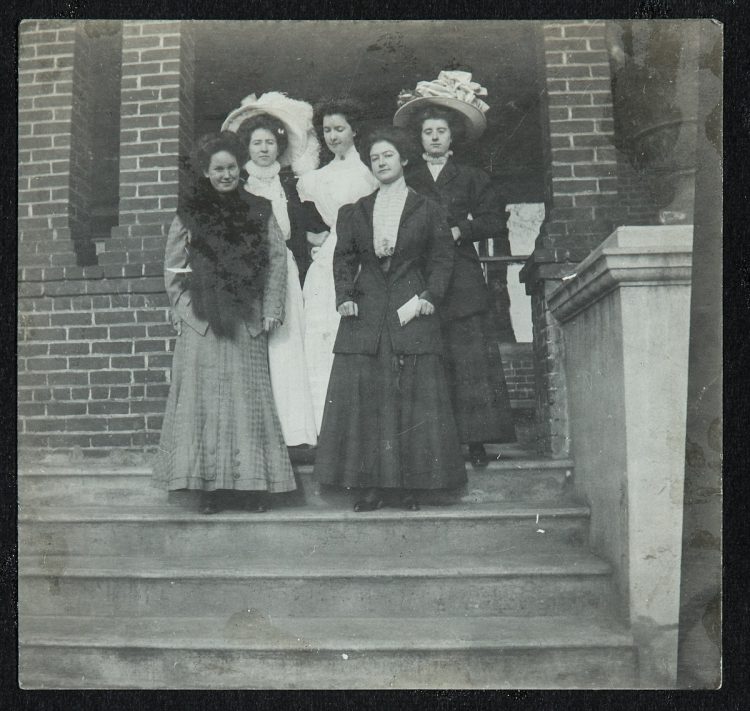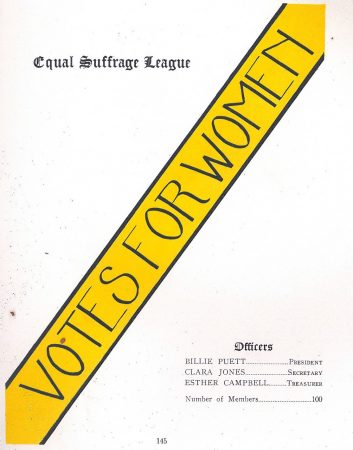Celebrating the Right to Vote: Profile of an R-MWC suffragist

As the nation celebrates the 100th anniversary of the passage of the 19th amendment, Randolph College remembers its alumnae who fought for the right to vote. Leading up to the amendment’s passage in Congress on June 4, 1919, students at then-Randolph-Macon Woman’s College were highly involved in the women’s suffrage movement, even starting an Equal Suffrage League on campus dedicated to the effort.
Below is a profile on one of the College’s most notable suffragists, who later became a politician herself:
Elizabeth Dabney Langhorne Lewis Otey was born in Lynchburg in 1880 and attended both R-MWC and Bryn Mawr College in the early 1900s, where she became involved in social work. She also studied at the University of Chicago and the University of Berlin, where she earned a doctorate in economics.

A listing of officers in the R-MWC Equal Suffrage League in a 1910s edition of The Helianthus
Otey was a member of the Equal Suffrage League of Virginia, and in 1911, helped found the Lynchburg Equal Suffrage League with her mother, Elizabeth Dabney Langhorne Lewis. She marched in the national suffrage parade in Washington, D.C. in 1913, and went on to serve as vice president for the Virginia chapter of the Congressional Union for Women Suffrage and chair of the Sixth Congressional District for the Virginia National Woman’s Party. Otey also proposed a statewide suffrage speakers’ bureau, and she was one of three speakers at a national suffrage convention in 1915.
Later in 1915, Otey organized a suffrage education program in Lynchburg and went on to accompany her mother on a speaking tour to organize local suffrage leagues—including reorganizing the one at R-MWC. She later served as editor for the Lynchburg Equal Suffrage League’s publication, The Lynchburg Woman’s Suffrage News.
During World War I, Otey was one of many suffragists who devoted their energy to supporting the war effort. She served on the board of home economics section of the war food administration in Lynchburg, and later chaired the committee that compiled and preserved records of the city’s war-related work for the Virginia War History Commission. In 1920, then serving as chair of the Sixth Congressional District for the Virginia National Women’s Party, Otey joined other suffragists in Richmond to lobby the General Assembly to ratify the 19th amendment. They were not successful, but the assembly did pass legislation enabling women to vote that year if enough other states ratified the proposed amendment—and they did.
After voting for the first time in 1920, Otey became a politician herself. In 1921, she sought and won the Republican nomination as superintendent of public instruction, becoming the first woman nominated by a major party for statewide office in Virginia. After losing the election, she ran for office as a socialist on two other occasions—first for the House of Delegates in 1931 and for the United States Senate in 1933.
In addition to her work in politics, Otey was a respected, published economist. According to the Library of Virginia, she went on to publish reports on child labor legislation and employer welfare work for the Department of Commerce and Labor, and in the 1910s, she served as a member of the National Conference of Charities and Corrections. Later in life, Otey worked for the Social Security Administration and the Foreign Economic Administration and published a book on her family’s genealogy. She died of pneumonia in Lynchburg in 1974.
Read more about Otey and her work in the Library of Virginia Archives here.
Tags: alumnae, college history, history, political science, Suffrage
